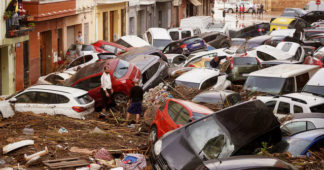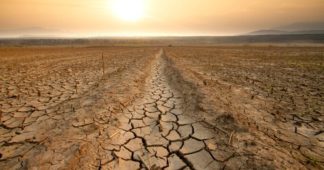Robin McKie
Mar 24, 2025
The climate professor is justified in identifying the thinktanks, fossil fuel companies and politicians responsible for exacerbating the climate crisis but his list of remedies is underpowered
In July 2023, prime minister Rishi Sunak and energy secretary Grant Shapps issued a defence of their decision to expand UK oil and gas production in the North Sea. The move was necessary to prevent household energy prices from rising sharply across the nation, they claimed.
It was a manifest distortion of the truth, to say the least. British oil and gas prices are set by global energy markets, which are barely affected by what the UK does in its heavily depleted North Sea oilfields. Changing production there would have made little difference to domestic bills though it would have damaged our attempts to reach net zero by 2050.
So were Sunak and Shapps merely incompetent, albeit to a spectacular degree? Or did their dissembling have a more unpleasant root in optics for their party faithfuls? Mike Berners-Lee is in no doubt. The pair were guilty of deliberate and cynical dishonesty, which he says is part of “an eruption of deceit unlike anything I’ve known in my lifetime”.
According to Berners-Lee, we face “a Polycrisis”, a rather unfortunate term that has nothing to do with an impending parrot pandemic but is his name for the combined catastrophes of the climate crisis, food security disruption, biodiversity loss and pollution that awaits us in the near future. A Climate of Truth is his attempt to pinpoint those who have led us to this frightening state of affairs and to offer ways to find salvation from global calamity.
In the former task, Berners-Lee – a fellow of the Centre for Social Futures at Lancaster University and brother of Tim Berners-Lee, inventor of the world wide web – is hearteningly robust in naming those responsible. Villains include bogus fig leaf thinktanks such as the “appallingly dishonest” Global Warming Policy Foundation; fossil fuel companies who are “the godfathers of climate chaos”; the gambling, aviation and food processing industries; a host of different politicians, most of them Tories, and almost every newspaper in the UK apart from the Guardian (and, presumably, the Observer, which – at the time of writing – is still its sister paper). It is a sweeping list of denunciations but a pretty fair one, in my view.
This is tame stuff for a work that claims to be a practical book. On the other hand, it is hard to see what the world can do as we hurtle towards a future of melted ice caps, drowned coasts, flooded cities, droughts, soaring heatwaves and wrecked coral reefs, not to mention catastrophic loss of biodiversity and widespread starvation.
It is not that people are unwilling to act, it should be stressed. In a 2024 survey, carried out in 125 countries, a substantial majority said they would sacrifice income to fund more vigorous environmental responses from their governments though, intriguingly, these individuals under-rated everyone else’s readiness to act. A total of 69% said they would pay to address the climate crisis while they reckoned that only 43% of others would do the same. In other words, willingness to act to tackle the coming climate crisis is significantly underestimated across the planet, a fact happily exploited by world leaders.
As James Baldwin – quoted by Berners-Lee – once put it: “Not everything that is faced can be changed but nothing can be changed until is faced.” Sadly, we are now approaching the point when it will be too late to confront, never mind resolve, an issue that will determine how future generations live on Earth.
We remind our readers that publication of articles on our site does not mean that we agree with what is written. Our policy is to publish anything which we consider of interest, so as to assist our readers in forming their opinions. Sometimes we even publish articles with which we totally disagree, since we believe it is important for our readers to be informed on as wide a spectrum of views as possible.











